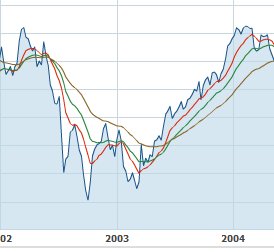When is the Best Time to Enter the Stock Market?
 People who want to know when the best time to enter the stock market is are usually thinking about “timing the market”. They want to get in when they can buy low and get out when they can sell high. Even among the most seasoned professional traders this is virtually impossible. And so the answer to the question always come down to this: why do you want to invest in the stock market in the first place?
People who want to know when the best time to enter the stock market is are usually thinking about “timing the market”. They want to get in when they can buy low and get out when they can sell high. Even among the most seasoned professional traders this is virtually impossible. And so the answer to the question always come down to this: why do you want to invest in the stock market in the first place?
If you’re thinking of putting your money into a short-term play (until just before the next big dive) then you are probably going to lose your money. Investors put their money into the market for one of two reasons: they either want to own a piece of a company (maybe with the intention of controlling or influencing its business decisions) or they are speculating on the changes in valuation of the stocks and other equities associated with these markets.
Small investors like you and me make money by riding the coat-tails of the big fund managers. By investing your money in a mutual fund you mitigate some of the risks you’re taking and offloading the burden of having to decide what to do about buying and selling stocks. Most mutual funds lose money at some point, but you can’t just look at the current valuation (price-per-share) of your mutual funds. You also have to look at any income they generate from interest and dividends. If you can wait for the stock market to change course then you don’t need to worry about what price your stocks or mutual funds trade at on any given day.
A frugal investor does not want to take many risks with his money. One of the safest investments you can make in the stock market is to buy shares in a mutual fund that tracks one of the major indexes like the Standard and Poor 500 or the Dow Jones Industrial Average. These index funds usually have very low maintenance costs (they require little strategic thinking) and they have proven growth records that span decades.
However, if it is impossible to know WHEN TO ENTER the stock market, it is nonetheless possible to know WHEN NOT TO ENTER: and that is when the stock market is in a downward trend. These downturns (sometimes called “crashes”) usually last anywhere from six months to one year. Sometimes they last longer than a year. What usually happens, after a stock market comes out of a crash, is that it experiences regular growth for several years. So if you wait until the stock market has turned around, you can begin buying stocks at relatively low prices.
One way to see that the market has turned is to look at technical indicators like Exponential Moving Averages (EMAs). These indicators can be used to follow 50-day, 100-day, and 200-day trends. You can actually set them yourself to follow and day-range you wish. But one common combination is the 50/100/200 EMA chart. The rule of thumb is that when you see BOTH the 50-day and 100-day moving average turn back up and the 50-day average rises above the 100-day average, then the market has probably turned around.
Even though by the time you confirm this turnaround the market will have recovered some of its lost value already, you are usually looking at several years’ worth of growth and expansion. So buying into the market at this point is a pretty wise decision.
It is not so easy to tell when you should stop adding to your investments. But again the combined technical indicators can show you that the market is in a downward trend. When the 50-day indicator has moved below the 200-day indicator you probably don’t want to buy any more stocks or mutual fund shares for a while. That doesn’t mean you can’t still make money in the stock market but if you’re a frugal investor you won’t be very speculative. So you should just wait out the storm.
Again, you do not have to take money out of the stock market just because it’s in a downturn. If you have limited your investments to the major index funds you should be okay even though their share prices will decline along with the rest of the stock market. Remember that you’ll get that value back when the market recovers and meanwhile you’ll earn interest and dividends.


